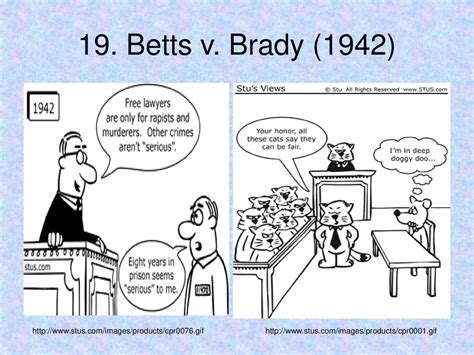Introduction

Betts v. Brady is a landmark 1942 Supreme Court case that ruled that the Fourteenth Amendment’s Due Process Clause does not require states to provide counsel for indigent criminal defendants in non-capital cases. This decision has had a significant impact on the criminal justice system in the United States, and it remains a controversial issue today.
Facts of the Case
In 1941, Lloyd Washington Betts was arrested in Maryland for robbery. He was convicted and sentenced to eight years in prison. Betts was indigent and could not afford to hire an attorney, so he represented himself at trial.
During the trial, Betts made several errors that would have likely been avoided if he had been represented by an attorney. For example, he did not object to the admission of illegally obtained evidence, and he did not cross-examine the prosecution’s witnesses.
After Betts was convicted, he appealed to the Maryland Court of Appeals, arguing that his conviction should be overturned because he had been denied the right to counsel. The Maryland Court of Appeals rejected Betts’s argument, holding that the Sixth Amendment’s right to counsel does not apply to non-capital cases.
Supreme Court Decision
The Supreme Court affirmed the Maryland Court of Appeals’ decision in a 6-3 ruling. The Court held that the Fourteenth Amendment’s Due Process Clause does not require states to provide counsel for indigent criminal defendants in non-capital cases.
The Court’s majority opinion was written by Justice Owen Roberts. Roberts argued that the right to counsel is not a fundamental right that is essential to a fair trial. He also argued that providing counsel for indigent defendants would be too expensive and would burden the criminal justice system.
Justice Hugo Black dissented from the Court’s opinion. Black argued that the right to counsel is a fundamental right that is essential to a fair trial. He also argued that providing counsel for indigent defendants would not be too expensive and would actually benefit the criminal justice system by reducing the number of wrongful convictions.
Impact of the Decision
Betts v. Brady has had a significant impact on the criminal justice system in the United States. The decision has led to the denial of counsel for indigent defendants in non-capital cases in many states. This has resulted in a number of wrongful convictions and has undermined the fairness of the criminal justice system.
Overturning of Betts v. Brady
In 1963, the Supreme Court overturned Betts v. Brady in Gideon v. Wainwright. Gideon held that the Sixth Amendment’s right to counsel applies to all criminal cases, regardless of whether the offense is capital or non-capital.
Gideon’s decision has had a major impact on the criminal justice system. It has ensured that all criminal defendants have the right to counsel, regardless of their financial status. This has helped to ensure the fairness of the criminal justice system and has reduced the number of wrongful convictions.
Betts v. Brady Today
Betts v. Brady remains a controversial issue today. Some legal scholars argue that the decision was wrongly decided and should be overturned. Others argue that Betts v. Brady is still good law and that it should not be overturned.
The debate over Betts v. Brady is likely to continue for many years to come. However, one thing is clear: the decision has had a significant impact on the criminal justice system in the United States.
Key Points
- Betts v. Brady was a 1942 Supreme Court case that ruled that the Fourteenth Amendment’s Due Process Clause does not require states to provide counsel for indigent criminal defendants in non-capital cases.
- The decision has had a significant impact on the criminal justice system in the United States, leading to the denial of counsel for indigent defendants in non-capital cases in many states.
- In 1963, the Supreme Court overturned Betts v. Brady in Gideon v. Wainwright, which held that the Sixth Amendment’s right to counsel applies to all criminal cases, regardless of whether the offense is capital or non-capital.
- The debate over Betts v. Brady is likely to continue for many years to come.
FAQs
- What is Betts v. Brady?
Betts v. Brady is a 1942 Supreme Court case that ruled that the Fourteenth Amendment’s Due Process Clause does not require states to provide counsel for indigent criminal defendants in non-capital cases.
- What was the impact of Betts v. Brady?
Betts v. Brady has had a significant impact on the criminal justice system in the United States, leading to the denial of counsel for indigent defendants in non-capital cases in many states.
- When was Betts v. Brady overturned?
Betts v. Brady was overturned in 1963 by the Supreme Court case Gideon v. Wainwright.
- What is the current status of Betts v. Brady?
The debate over Betts v. Brady is likely to continue for many years to come. However, one thing is clear: the decision has had a significant impact on the criminal justice system in the United States.
Conclusion
Betts v. Brady is a complex and controversial case that has had a significant impact on the criminal justice system in the United States. The decision has been criticized for leading to the denial of counsel for indigent defendants and for undermining the fairness of the criminal justice system. However, the decision has also been defended as being necessary to protect the rights of states and to prevent the criminal justice system from being overburdened. The debate over Betts v. Brady is likely to continue for many years to come.
